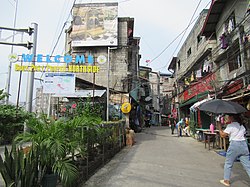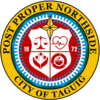Post Proper Northside
Barangay 30 | |
|---|---|
 Entrance to Teachers' Compound at Kalayaan Avenue in 2022, prior to its transfer to Taguig | |
 Map of Makati with Post Proper Northside highlighted. Areas in light red indicate overlapping with Fort Bonifacio, Taguig. | |
| Coordinates: 14°33′46″N 121°03′16″E / 14.56265°N 121.05440°E | |
| Country | Philippines |
| Region | National Capital Region |
| City | Taguig |
| District | 2nd district of Taguig |
| Established | December 11, 1972[a] |
| Transfer of control to Taguig | 2023 |
| Government | |
| • Type | Barangay |
| • Barangay Captain | Richard Pasadilla |
| • SK Chairperson | Joshua Daniel Espejo |
| Area | |
| • Total | 2.376 km2 (0.917 sq mi) |
| Population (2020) | |
| • Total | 57,940 |
| • Density | 24,000/km2 (63,000/sq mi) |
| Time zone | UTC+8 (PST) |
| Postal Code | 1647 |
| Area Code | 02 |
Post Proper Northside, also known as Post Proper North Fort Bonifacio Barangay 30, or simply Northside, is one of the 38 barangays of Taguig, Philippines. It is the fourth most populous barangay in the city, with a population of 57,940 according to the 2020 census.[2] It is one of the ten Embo barangays, and one of the two Inner Fort barangays, the other being the Post Proper Southside Occupied by Bonifacio Global City.
Post Proper Northside was established in 1972 and has overlapping territorial claims with Barangay Fort Bonifacio, which controls the Bonifacio Global City (BGC) after it was held by Barangay Ususan. Following the resolution of the Makati–Taguig territorial dispute, which resulted in Taguig victory, the territorial jurisdiction of Post Proper Northside was transferred from Makati to Taguig in 2023.
- ^ Cite error: The named reference
portallocationwas invoked but never defined (see the help page). - ^ Census of Population (2020). Table B - Population and Annual Growth Rates by Province, City, and Municipality - By Region. Philippine Statistics Authority. Retrieved 8 July 2021.
Cite error: There are <ref group=lower-alpha> tags or {{efn}} templates on this page, but the references will not show without a {{reflist|group=lower-alpha}} template or {{notelist}} template (see the help page).


